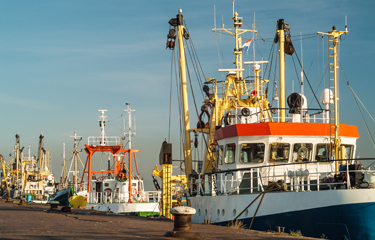European Association of Fish Producers Organizations President Esben Sverdrup Jensen has called for the revision of parts of the European Union’s Common Fishery Policy to simplify the transition of the E.U.’s fishing fleet to using cleaner fuels.
With the price of conventional fuels soaring in the wake of the invasion of Ukraine, Sverdrup Jensen said the E.U. should relax limits on boat capacity “because vessels that use alternative fuels like ammonium require fuel tanks twice as big as those using current fuels.”
“Since new vessels capacity isn’t allowed, the only solution is to buy up lots of smaller vessels from operators we are meant to be celebrating,” he said, noting the fact that 2022 has been designated by the United Nations as the year of artisanal fisheries.
Sverdrup Jensen spoke on Tuesday, 26 April, at Seafood Expo Global in Barcelona, Spain, during a panel titled “From Revolution to Evolution: The Fishery and Aquaculture Market in a Post-COVID-19 World.”
Also on the panel was Christophe Vande Weyer, a policy officer for the Directorate-General for Maritime Affairs and Fisheries of the European Commission. He didn’t directly respond to Sverdrup Jensen’s request, but said the E.C. has put in place a flexible mechanism of support fishing companies and aquaculture producers to help them operated during the COVID-19 pandemic. On 25 March, the E.C. expanded that funding device to give its member-states the ability to offer financial compensation to operators in the fishing and aquaculture sectors “to mitigate the effects of the market disruption, in particular for their income forgone, and for additional costs incurred.”
Seafood producers and seafood storage facilities are also eligible for funding under the crisis mechanism of the European Maritime, Fisheries, and Aquaculture Fund (EMFAF), and on 13 April, 2022, the E.C. also introduced a proposal to give the same flexibility to funds allocated to the European Maritime and Fisheries Fund (EMFF), which is funded by the E.U.’s Common Fisheries Policy.
Numerous European fishing firms took quick advantage of those funding opportunities when soaring fuel costs following Russia’s invasion of Ukraine consigned many E.U. trawlers to their home ports, Vande Weyer said.
“We were able to react quickly to the latest crisis,” he said. “Fuel costs rose dramatically, while aquaculture and processing face higher energy bills. There has also been tighter access to [aquaculture] inputs like sunflower oil and wheat.”
Photo courtesy of Martin Bergsma/Shutterstock







